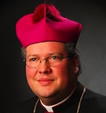
Prime Bishop Anthony Mikovsky
The Day of Pentecost
- May 30, 2023
- , 7:14 pm
- , Prime Bishop Blog
As a closing to the Easter season, the Church celebrates the Solemnity of Pentecost, the Descent of the Holy Spirit. Following the ascension of our Lord, on Ascension Thursday, Jesus told the apostles to wait for the Holy Spirit. “While staying with them, [Jesus] ordered them not to leave Jerusalem, but to wait there for the promise of the Father. ‘This,’ He said, ‘is what you have heard from Me; for John baptized with water, but you will be baptized with the Holy Spirit not many days from now.’” (Acts 1:4-5)
In this time of waiting the Apostles were in prayer for nine days, when suddenly something quite astounding happened on the day of Pentecost. “When the day of Pentecost had come, they were all together in one place. And suddenly from heaven there came a sound like the rush of a violent wind, and it filled the entire house where they were sitting. Divided tongues, as of fire, appeared among them, and a tongue rested on each of them. All of them were filled with the Holy Spirit and began to speak in other languages, as the Spirit gave them ability.” (Acts 2:1-4)
As we contemplate the events of this day within Scripture, we must concern ourselves with how these events are lived out in the Church at the present moment. First and foremost, we must realize that “Pentecost” as a feast was already known to the ancient Jews. It was one of the three main pilgrimage feasts of the year and it occurred fifty days after Passover. In part this explains why in the reading from the Book of Acts, there are so many individuals in Jerusalem.
The feast originally began as the first fruits offering of the wheat harvest, but later spiritual aspects were also added. Occurring as it does seven weeks after the Passover, this feast day is commemorated as the time in which the people of Israel, after leaving Egypt following the Passover, received the books of the law on Mount Sinai. It is this aspect that we must keep in mind as we reflect on the meaning of Pentecost for us today and also exactly what happened following the descent of the Spirit.
We read further in the Book of Acts, “Now there were devout Jews from every nation under heaven living in Jerusalem. And at this sound the crowd gathered and was bewildered, because each one heard them speaking in the native language of each. Amazed and astonished, they asked, ‘Are not all these who are speaking Galileans? And how is it that we hear, each of us, in our own native language? Parthians, Medes, Elamites, and residents of Mesopotamia, Judea and Cappadocia, Pontus and Asia, Phrygia and Pamphylia, Egypt and the parts of Libya belonging to Cyrene, and visitors from Rome, both Jews and proselytes, Cretans and Arabs – in our own languages we hear them speaking about God’s deeds of power.’” (Acts 2:5-11)
In reflecting on this passage, we see that the Gospel, the good news of Jesus Christ, is meant for all people. Devout Jews from every nation are gathered to hear the preaching of the Apostles. And yet even more than that, there are visitors from Rome, there are others as well, Cretans and Arabs. So, the proclaimed message that our Lord and Savior Jesus Christ died and was raised from the dead is not for the Jews alone, but is directed to all people. Secondly and a little less obviously from the reading, the message is to go forth in all directions of the world. If we look at a map with Jerusalem at the center, then the cities listed are those from every direction around Jerusalem. This shows us that the gospel of Jesus Christ is meant to be carried out from Jerusalem, that central site of the death and resurrection of Jesus, to the rest of the world in every direction.
A second point is that the apostles are to bring the message to every person in their own language. Although this occurred as a miracle on this first feast of Pentecost, this is something that we need to be a part of in different ways today. Our Constitution speaks to this in the Preamble. In speaking of a ‘national Church’ it states: “If our people have any mission in the solution of humanity’s greatest problems, then they must also have a faith which will bear an imprint of their character, a national Church, as all creative nations had in the past and have today. Our Polish National Catholic Church in these self-determining endeavors is the first step in the life of our people and, God granting, in the life of all people in the future.”
Another aspect that we must be concerned with is a slightly different interpretation of the word ‘language.’ As we seek to spread the Gospel and preach the message concerning “God’s deeds of power,” we must do so being sensitive to those to whom the message is directed. We must speak their language and continuously invite them in to partake of our fellowship. While we certainly set for all people a high moral standard in how we are to live as followers of our Lord and Savior Jesus Christ, we must also preach the message that forgiveness is available for those who sincerely seek God and the doors of the Church are open to those who desire to know Christ in a better and closer way.
In this feast of Pentecost, we are also reminded that now, because the Holy Spirit has descended upon the Church and upon each of us, we have a more immediate and closer relationship to Almighty God through the Spirit. And this realization is connected to the giving of the Law that is celebrated on Pentecost. The prophet Jeremiah speaks to this in his description of the new covenant. The days are surely coming, says the Lord, when I will make a new covenant with the house of Israel and the house of Judah. It will not be like the covenant that I made with their ancestors when I took them by the hand to bring them out of the land of Egypt – a covenant that they broke, though I was their husband, says the Lord. But this is the covenant that I will make with the house of Israel after those days, says the Lord: I will put my law within them, and I will write it on their hearts; and I will be their God, and they shall be my people.” (Jeremiah 31:31-33)
Now because of the descent of the Holy Spirit, God’s law, God’s way, lives within us. Certainly this does not happen only in one moment, but it is a growing in the presence and knowledge of God within us. It begins in our baptism; it is strengthened in the Sacrament of Confirmation; it is nourished each and every time we receive Holy Communion; it is expressed in the work that we do building up the kingdom of God. In all this we take up the work that was begun by the Apostles on that first Pentecost as we continue to proclaim the good news of Jesus Christ, the mighty deeds of God, to all around us.
My brothers and sisters, as we celebrate the Solemnity of Pentecost, not only for one Sunday, but for many weeks to come, let us all live strongly in the presence of the Holy Spirit in our lives. Let us ask God the Father to continue to send the Holy Spirit and His seven gifts: Wisdom, Understanding, Knowledge, Counsel, Strength, Godliness and Fear of the Lord. And let us go forth into our lives and into our world using these gifts to announce to all people the saving message of Jesus Christ, continually seeking to build His kingdom here on earth.
Come, Holy Spirit.

